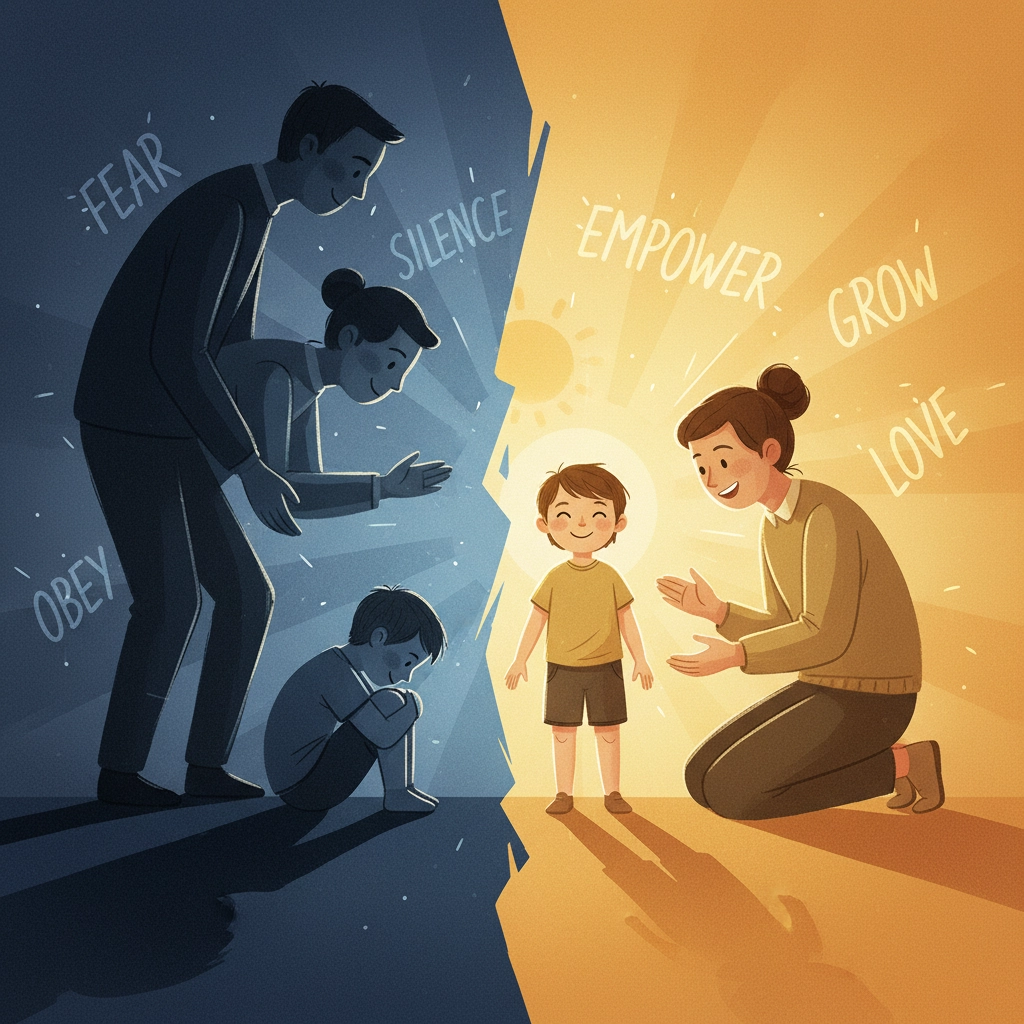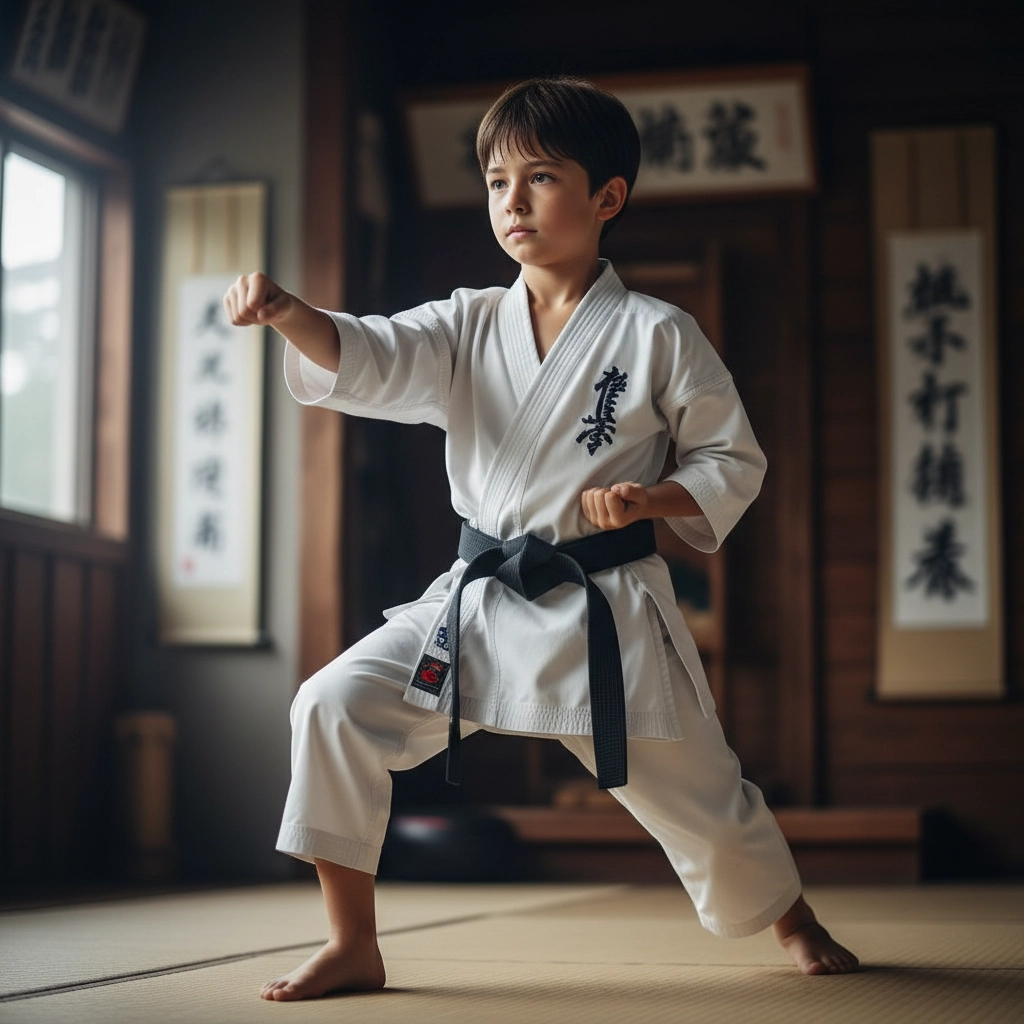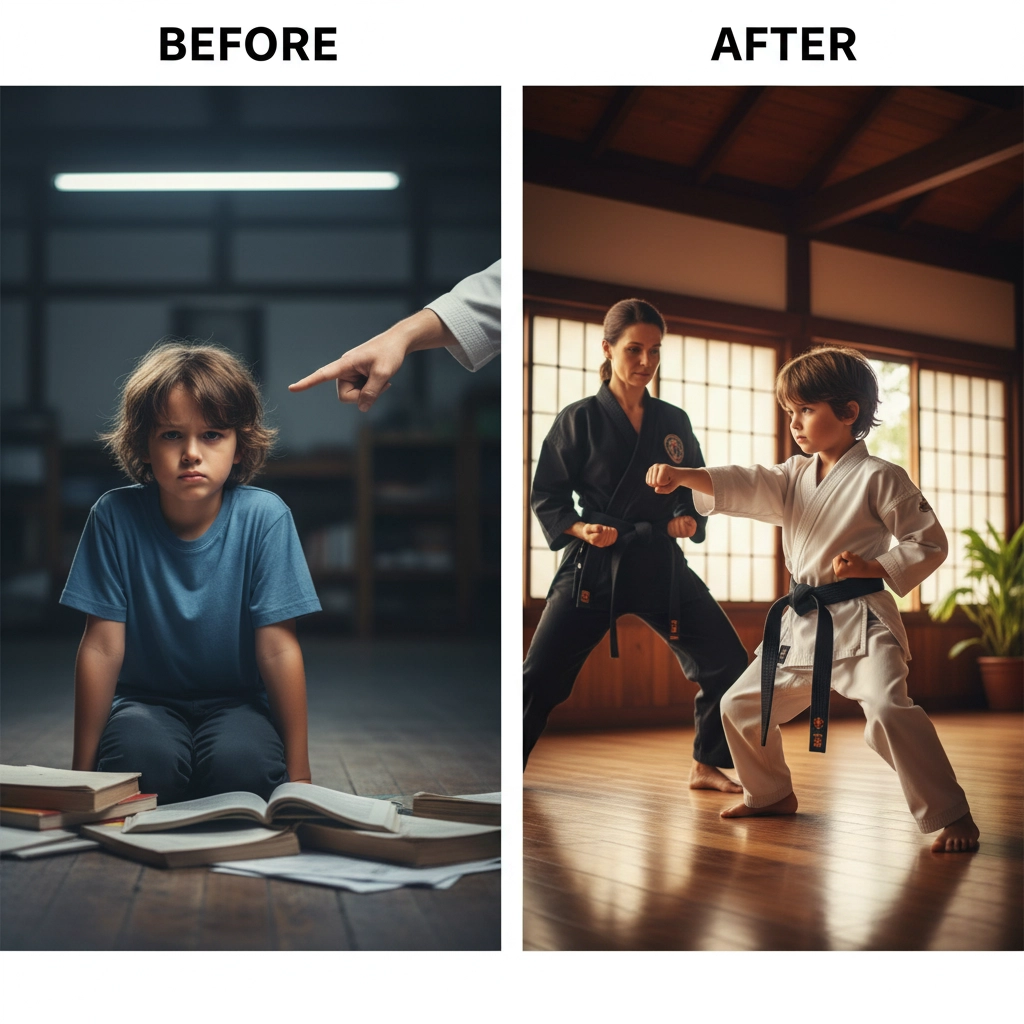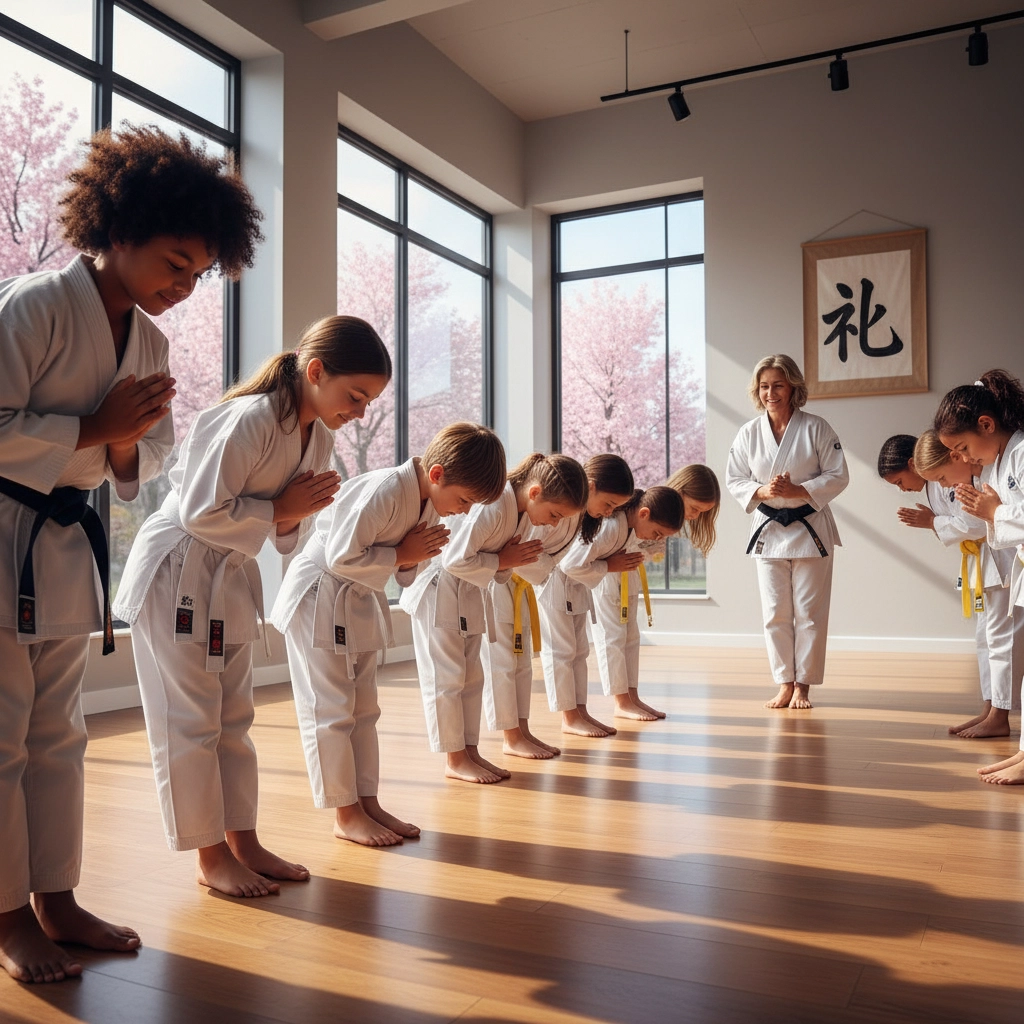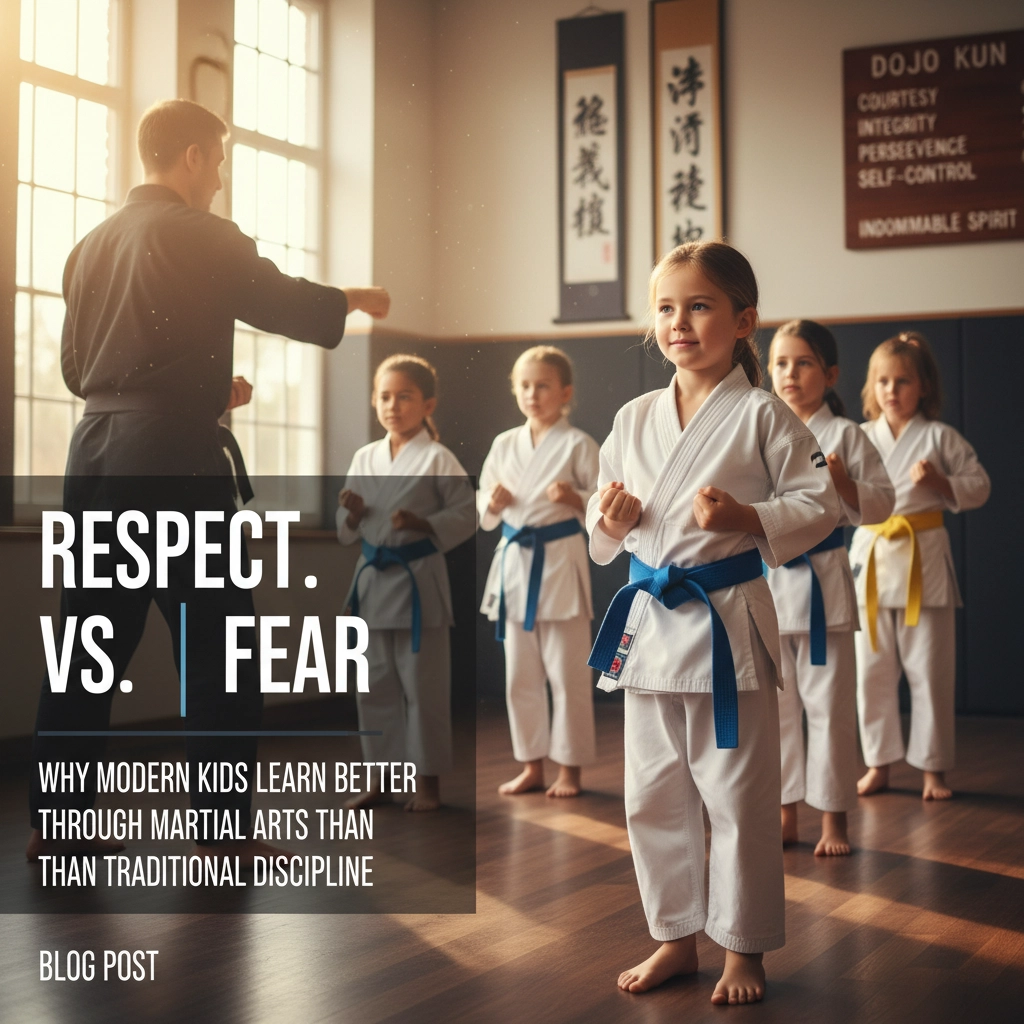
Respect vs. Fear: Why Modern Kids Learn Better Through Martial Arts Than Traditional Discipline
October 30, 2025

Respect vs. Fear: Why Modern Kids Learn Better Through Martial Arts Than Traditional Discipline
You’ve probably heard it before: “Kids these days just don’t respect authority!” But here’s the thing – maybe we’ve been approaching respect all wrong. As parents in 2025, we’re dealing with a generation that questions everything, challenges authority naturally, and responds differently than we did as kids.
The old-school approach of “do it because I said so” isn’t cutting it anymore. Modern children are wired differently. They need to understand the “why” behind rules, and they respond better to earning respect rather than being forced into compliance through fear.
That’s where martial arts comes in – and why it’s becoming the go-to solution for parents who want to raise respectful, confident kids without relying on outdated fear-based methods.
The Fear-Based Discipline Trap
Traditional discipline often relies on creating fear of consequences. Think about it: “Do your homework or you’ll lose your phone.” “Clean your room or you’re grounded.” “Stop talking back or you’ll get in trouble.”
While these methods might work temporarily, they create compliance through fear rather than genuine respect or understanding. Kids learn to avoid getting caught rather than understanding why certain behaviors matter. They develop anxiety around making mistakes instead of learning from them.
Even worse, fear-based discipline often backfires with modern kids. They either become overly compliant and lose their natural confidence, or they rebel completely and become more defiant. There’s rarely a healthy middle ground.
The problem is that fear-based approaches don’t teach kids why respect matters. They just teach them to go through the motions to avoid punishment. That’s not real respect – that’s just good acting.
How Martial Arts Builds Genuine Respect
Martial arts takes a completely different approach. Instead of demanding respect through intimidation, it creates an environment where respect naturally develops through understanding and experience.
In a martial arts class, kids bow to their instructors not because they’re forced to, but because they genuinely appreciate what they’re learning. They see their instructor as someone who’s helping them become stronger, more confident, and more capable. The respect grows organically from that relationship.
Here’s what makes it different:
Respect is earned, not demanded. Instructors demonstrate their knowledge and skill, showing kids why they deserve respect. Kids don’t respect their instructor because they have to – they respect them because they want to learn what they know.
Everyone starts as a beginner. This creates humility naturally. When a kid realizes that even their instructor was once a white belt who struggled with basic techniques, it builds empathy and respect for the learning process.
Mistakes become learning opportunities. Instead of being punished for getting something wrong, kids are guided toward improvement. This removes the fear element and replaces it with curiosity and determination.
The Confidence Connection
Here’s where martial arts gets really interesting – it creates a positive feedback loop between confidence and respect. As kids become more skilled and confident in their abilities, they actually become more respectful of others, not less.
Research consistently shows that children who train in martial arts demonstrate reduced aggressive behavior and are less likely to be bullied or to bully others. Why? Because confident kids don’t need to prove themselves through aggression or disrespect.
When a child knows they can defend themselves, they don’t feel threatened by others. When they’re not feeling threatened, they can approach situations with respect and calm confidence rather than defensiveness or aggression.
This is the opposite of what many parents fear. They worry that teaching their kids martial arts will make them more aggressive or disrespectful. In reality, it does the opposite – it gives them the inner security to be respectful even in challenging situations.
Natural Consequences vs. Artificial Punishment
One of the biggest differences between martial arts and traditional discipline is how consequences work. In traditional discipline, consequences are often artificial – they’re punishments imposed by adults that don’t necessarily connect to the behavior.
In martial arts, consequences are natural and immediate:
- Don’t practice? You don’t improve and fall behind your classmates
- Don’t pay attention? You can’t learn the technique properly
- Don’t show respect? Other students don’t want to partner with you
- Don’t follow safety rules? You might get hurt or hurt someone else
These natural consequences teach kids that their actions have real-world results. They learn accountability not because they’re afraid of getting in trouble, but because they can see the direct connection between their choices and outcomes.
Building Life Skills Through Structure
Martial arts provides structure, but it’s not the rigid, authoritarian structure of traditional discipline. Instead, it’s a framework that helps kids understand how to navigate relationships, challenges, and personal growth.
Kids learn to:
- Show up consistently (classes are at set times)
- Work hard toward goals (belt testing and skill development)
- Help others succeed (partner work and group exercises)
- Handle failure and setbacks (losing sparring matches or struggling with techniques)
- Celebrate others’ success (watching classmates advance in rank)
This structure teaches respect for process, effort, and community – not just for authority figures.
Why Modern Kids Respond Better to This Approach
Today’s kids are growing up in a world where information is instantly available and authority is constantly questioned. They see inconsistencies in adult behavior, they’re exposed to different viewpoints constantly, and they’re encouraged to think critically in many areas of their lives.
The old model of “respect authority because it’s authority” doesn’t make sense to them. They need to see that respect is earned and that the people they’re respecting actually deserve it based on their knowledge, character, and actions.
Martial arts instructors earn respect by:
- Demonstrating real skills
- Helping students improve
- Treating everyone fairly
- Showing up consistently
- Continuing to learn and grow themselves
This creates a model of respect that kids can understand and embrace. It’s not about blind obedience – it’s about recognizing and appreciating value, expertise, and positive leadership.
The Ripple Effect at Home and School
Parents consistently report that kids who train in martial arts show improved behavior at home and school. They’re more responsible with homework, more cooperative with siblings, and more respectful in their interactions with teachers and parents.
But here’s the key – this improvement isn’t because they’re afraid of consequences. It’s because they’ve internalized the values of respect, accountability, and personal responsibility. They’ve learned that these behaviors make their lives better and help them achieve their goals.
When a child understands that showing respect to their teacher helps them learn better, or that being responsible with homework helps them feel proud of their accomplishments, they choose these behaviors because they work – not because they’re avoiding punishment.
Making the Shift in Your Family
If you’re ready to move away from fear-based discipline and toward respect-based learning, martial arts can be the catalyst your family needs. But it’s not just about signing your kid up for classes – it’s about embracing the philosophy at home too.
Start by:
- Explaining the “why” behind your family rules
- Creating natural consequences instead of artificial punishments
- Showing respect for your children’s questions and perspectives
- Demonstrating the behaviors you want to see
- Focusing on teaching rather than punishing when mistakes happen
The goal isn’t to create perfectly obedient kids – it’s to raise confident, respectful young people who choose good behavior because they understand its value, not because they’re afraid of what will happen if they don’t.
At Changing Lives Martial Arts, we see this transformation happen every day. Kids walk in testing boundaries and walk out understanding them. They come in seeking attention through negative behavior and leave knowing how to earn positive recognition through effort and growth.
Ready to see what respect-based learning can do for your family? Visit us at Changing Lives Martial Arts to learn more about our programs and how we’re helping modern kids develop genuine respect, confidence, and life skills that will serve them well beyond childhood.
Because at the end of the day, we’re not just teaching martial arts – we’re showing kids that respect isn’t something you demand or fear into existence. It’s something you build, earn, and share. And that makes all the difference.
